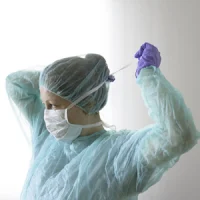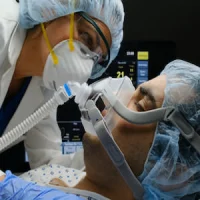The coronavirus disease (COVID-19) is now a global pandemic, and almost every country is facing problems on how to prevent its spread. While the majority of patients with COVID-19 can recover as outpatients, a significant number require admission to the ICU for more aggressive medical care. The ICU is vulnerable to contamination with organisms, and the risk of transmission of any infection, especially one that is acquired via airborne transmission, is high.
This review discusses the key principles and strategies that can be used to better prepare the ICU for patients infected with COVID-19. Most of the lessons learned on ICU management have come from recent experiences with infected COVID-19 patients in China, Italy and Singapore.
An infection like COVID-19 can present many challenges to the ICU. First of all, there is a limitation of resources and equipment; second, infection control has to occur at many levels and must be continually enforced. There is also the issue of protecting the healthcare workers, and at the same time, deliver an acceptable standard of care.
The key strategies that have been developed to prepare the ICU against the spread of coronavirus include the following: having a team dedicated to the management of COVID-19 patients and a command centre where all the queries can be made. The next and most important thing is prompt identification and isolation of patients suspected or confirmed with COVID 19. This also means having a good triage protocol with rapid access to diagnostic testing.
To minimise exposure to other non-COVID19 patients in the ICU, a path/route should be selected and reserved only for infected COVID-19 patients. The next step is to designate an isolation space in the ICU for these patients to confine the infection. These isolation rooms should ideally have negative pressure ventilation with continuous recycling of filtered air. Each healthcare system will need to constantly update their ICU protocols and suspected case criteria to ensure that there is a balance of safety, while ensuring optimum resource utilisation at the same time.
Since all ICUs have a limited capacity, alternative sites to look after critically ill patients must be identified and developed early. This may involve the utilisation of step-down unit beds into ICU beds. To ensure that the ICU bed capacity is not overwhelmed, all elective surgery and non-essential surgical services should be postponed so that the resources can be directed to critical care.
When it comes to the triage of patients who may need an ICU bed, one must follow ethical principles and guidelines to ensure that there is equitable delivery of care for all patients. Care must be provided to all those who need it. To minimise contamination in the hospital, one or two operating rooms should be dedicated to infected patients, in case surgery is required.
At all times, there has to be effective communication within the ICU. Protocols need to be updated continuously. All ICU healthcare providers should work closely with infection control, cleaning services, engineering, and other departments to ensure smooth and coordinated care. There should be daily video conferences among ICU staff to ensure that critical care is not compromised. Finally, continuing education and support (physical and mental) of all ICU staff is highly recommended so that any challenges of COVID19 can be dealt with in a timely fashion.
Source: Critical Care
Image Credit: iStock
References:
Goh KJ et al. (2020) Preparing your intensive care unit for the COVID-19 pandemic: practical considerations and strategies. Critical Care.
Latest Articles
ICU, infection control, COVID-19, heatlhcare workers
Preparing the ICU for COVID-19










